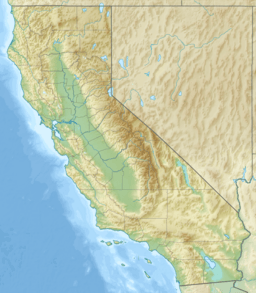Rainbow Mountain (California) facts for kids
Quick facts for kids Rainbow Mountain |
|
|---|---|
| Highest point | |
| Elevation | 7,619 ft (2,322 m) |
| Geography | |
| Location | Siskiyou County, California, U.S. |
| Parent range | Cascade Range |
| Topo map | USGS Rainbow Mountain |
| Geology | |
| Mountain type | Stratovolcano |
| Volcanic arc/belt | Cascade Volcanic Arc |
| Last eruption | Pleistocene age |
Rainbow Mountain is a special kind of mountain called a stratovolcano. It's found at the southern end of the Cascade Range in Siskiyou County, California. This mountain sits between two other famous volcanoes: Mount Shasta and the Medicine Lake Volcano. Rainbow Mountain is made of volcanic rocks called andesitic and dacitic rocks. These rocks were formed a very long time ago during a period known as the Pleistocene age. Its last known eruption also happened during this ancient time.
Contents
What is Rainbow Mountain?
Rainbow Mountain is a type of volcano known as a stratovolcano. Imagine a tall, cone-shaped mountain built up by many layers. These layers are made of hardened lava, ash, and other volcanic materials. Stratovolcanoes often have explosive eruptions because the lava they produce is thick and sticky. This thick lava traps gases, which can then build up pressure and cause big blasts.
Where is Rainbow Mountain Located?
Rainbow Mountain is in northern California. It's part of the Cascade Range, which is a long chain of volcanoes that stretches through the western United States and Canada. This mountain is located in Siskiyou County, California. It's easy to find on a map because it's right between the much larger Mount Shasta and the Medicine Lake Volcano.
How Old is Rainbow Mountain?
Scientists believe Rainbow Mountain formed during the Pleistocene age. This was a very long time ago, starting about 2.6 million years ago and ending about 11,700 years ago. The rocks that make up Rainbow Mountain, like andesite and dacite, were created during this ancient period. Its last eruption also happened during the Pleistocene age, meaning it hasn't erupted in thousands of years.
What are its Rocks Made Of?
The rocks that form Rainbow Mountain are mostly andesitic and dacitic. These are types of volcanic rocks.
- Andesitic rocks are usually dark to medium gray. They form from lava that is thicker than the runny lava found in shield volcanoes.
- Dacitic rocks are often lighter in color and even thicker than andesitic lava. Because these lavas are thick, they tend to trap gases, which can lead to more explosive volcanic eruptions. This is why stratovolcanoes like Rainbow Mountain are often cone-shaped with steep sides.



